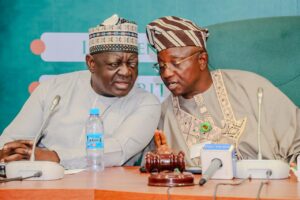

The House of Representatives Ad-hoc Committee on Mineral Exploitation, Security and Anti–Money Laundering is set to launch investigation into activities of Illegal Mining Nationwide.
 Chairman of the Committee, Sanni Egidi Abdulraheem who made this known during a meeting of the Committee in Abuja, noted that they are committed to unraveling and bringing to book, those involved in illegal mining activities including those that aided them.
Chairman of the Committee, Sanni Egidi Abdulraheem who made this known during a meeting of the Committee in Abuja, noted that they are committed to unraveling and bringing to book, those involved in illegal mining activities including those that aided them.
Abdulraheem who is the House of Representatives Member Representing Ajaokuta Federal Constituency, also said recommendations will be made at the end of the Committee’s findings and adjustments will be made where necessary to ensure Nigeria’s rich mineral resources are harnessed for the benefit of all Citizens of the Country.
Read below, the full Communiqué issued after the Meeting.
Pursuant to the resolution of the House, the Ad-hoc Committee shall undertake the following responsibilities:
1. Conduct a comprehensive investigation into the scale, patterns, actors, and modalities of illegal mineral exploitation across the Federation, with a view to identifying the causes, consequences, and extent of associated revenue leakages.
2. Examine the operational roles, effectiveness, and challenges of security agencies deployed to mineral-bearing areas—particularly the Nigeria Security and Civil Defence Corps (NSCDC), Mining Marshals, and other relevant formations and assess their capacity to secure mining sites and protect national assets.
3. Investigate the security implications of illegal mining activities, including their links to organized crime, communal conflicts, environmental degradation and threats to national stability.
4. Undertake an appraisal of the legal and regulatory framework governing mineral exploitation in Nigeria with a view to identifying gaps, overlaps, and enforcement deficiencies, and make recommendations for legislative amendments or new enactments where necessary.
5. Probe the financial flows associated with illegal mineral extraction, including mechanisms through which proceeds are laundered, concealed, or transferred, and identify the roles of individuals, networks, and institutions in facilitating such illicit transactions.
6. Interface with relevant agencies including the Ministry of Solid Minerals, Ministry of Mines and Steel Development, Nigerian Financial Intelligence Unit (NFIU), Economic and Financial Crimes Commission (EFCC), security agencies, state governments, traditional institutions, and licensed mining operators—to obtain submissions, documents, data, and expert opinions.
7. Assess the adequacy of current anti–money laundering measures within the solid minerals sector and recommend strengthened oversight mechanisms, compliance standards, and enforcement actions to curb illicit financial flows.
8. Recommend strategies to block revenue leakages, enhance transparency in mineral value chains, and ensure that the exploitation of mineral resources contributes maximally and legitimately to national development.
9. Conduct public hearings and stakeholder engagements to gather evidence, facilitate transparency, and build national consensus on measures to address illegal mining and its attendant security and financial risks.
10. Submit a detailed report to the House within the stipulated timeframe, containing findings, conclusions, and actionable recommendations for legislative, policy, administrative, and security interventions.
11. Perform any other functions as maybe assigned by the House in furtherance of this mandate.
